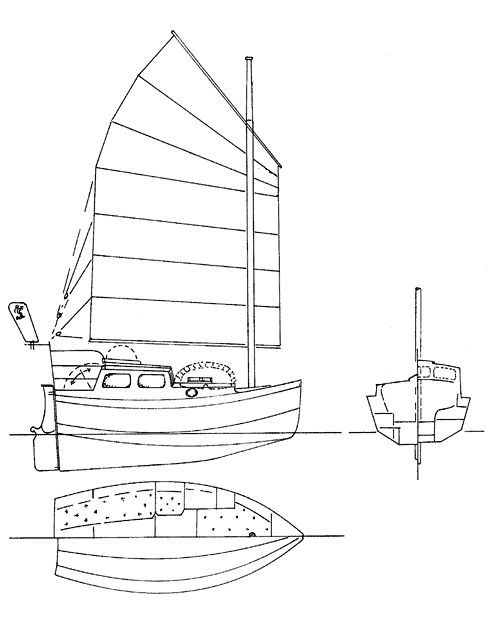|
Here's an interesting design project
that has had the go ahead, there has been a lot of discussion
on the microcruiser
Yahoo Group about very small transoceanic yachts.
I’ve put my thoughts down on paper and am keen to
hear what people think.
Swaggie. ( Australian slang) A tramp, or itinerant
who carries his bedroll, or “ Swag” upon his
back.
My client loves small craft and has long had an ambition
to cruise a very small cruiser that would be capable of
blue water cruising from his home on the Southern Coast
of Australia. For those not familiar with the area that’s
roaring 40s territory and there are very long stretches
of coast without shelter or refuge. In a storm the best
option is to get as far out to sea as possible, close the
hatch and get into your bunk but of course few very small
cruisers are designed to survive this sort of treatment.
We’d corresponded about ideas for more than a while,
and we seemed to have similar ideas if slightly different
approaches so I drew a study proposal and sent it off to
see what he thought.
Bingo, a cheque arrived by return! Hit the jackpot and rang
the bell!
So here is Swaggie!

The basic premise of the boat is that she
is sailed from inside. Her Junk rig is the key to this,
being able to be hoisted, reefed and sheeted from the main
hatch means that a conventional cockpit and sail handling
areas are not really required. This is a huge help as at
less than 18 ft she is not big enough to have both a useful
cockpit and a spacious cabin, seeing as she is a cruiser
and needs to be comfortable the cabin is the priority.
Her accommodation is as follows,
Double bunk forward, sorry but the big free standing mast
intrudes but not too badly. There are large lockers underneath
the double and sitting headroom over the after end, a small
locker port and starboard, a galley bench one side at the
after end of the bunk and a general purpose bench the other.
There is a lot of storage in this area, some needing the
bed to be lifted but a lot of it readily accessible.
Aft of that, and still under the low part of the cabin
are port and starboard armchairs, really comfortable places
to sit when off watch or just relaxing and in a very small
area there is enough room for my 5 ft 9in frame to stand
a little bent and pull my trousers up.
Step up slightly and there is a single bunk down each side,
sitting on here your eye will be up at window level, with
360 deg vision and a view of the sail through the Polycarbonate
dome in the main hatch you can sit in here with the inside
tiller and be totally sheltered from sun, wind or rain.
Water tanks and extra storage goes in under those bunks
and the armchairs, I’ve allowed for 100 litres of
water which is consistent with the boats planned 40 days
with 2 persons range.
Her deck layout has an anchor well up at the sharp end,
a cabin top organised so that a custom designed 6ft 6in
dinghy can be carried on the forward part of the cabin top
where it protects the big skylight while at sea, and a flat
between the cabin and the transom which is large enough
to lie down and stretch out on, or to sit up and steer with
the outside ( emergency) tiller if the weather is clement.
She has a permanent pushpit aft which not only reduces the
chances of man overboard, but trebles as the mainsheet horse
and the self steering vane ( plans will include the vane
gear and the linkage to the rudder trim tab).
Her hull form is that which the Houdini has so well proven,
a narrow flat bottom, steep deadrise chine panels and well
flared topsides, the fine entry gives a nice easy motion
and the cross sectional shape gives a gentle roll with very
high ultimate righting moment, both safe and comfortable.
Construction is simple two skin ply over sawn frames and
stringers, very easy to build and extremely tough, there
is nothing here to bother a keen amateur with reasonable
tool skills.
Her ballast is 450 kg of lead some 550 mm down below the
waterline, and heeled to 90 deg she will lift something
like 60 kg with her masthead which is a huge righting moment
for a little boat.
Her vital stats are
LOA - 17 ft 6in - 5.2m
Beam - 7 ft 10in - 2.4m
Draft - 2ft 8in - 800 mm
Sail area - 244 sq ft - 22.5 sq m
Headroom - 5 ft 2in - 1.7m
Headroom under dome - 6ft 6in - 2m
Displacement - 2650 lbs - 1200 kg bare ship rigged.
Normal full load displacement - 3850 lbs - 1750 kg
Max safe displacement - 4180 lbs - 1900 kg.
I will be drawing the plans for Swaggie January/Febuary
and am looking forward to seeing the prototype in the water.
In the meantime, lets hear it, any suggestions over there
on Micro
Cruiser, Small
sailboats, boatdesign
or JWBuilders
Yahoo groups? What have I forgotten, what could I do better?
John Welsford.
Designer
[email protected]

|

